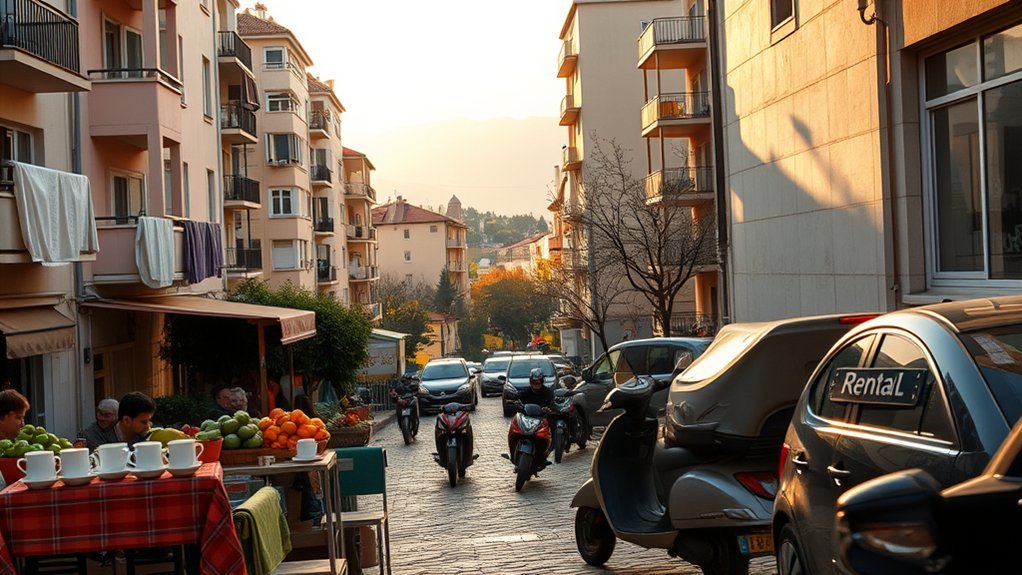You’ll find living in Albania is noticeably cheaper than in most Western countries, but local wages are low so you’ll need to budget. Expect monthly essentials around $1,000 for a couple, rent in Tirana €365–€380 for a one‑bed, utilities $60–$95, internet $17–$28, and groceries $160 per person. Public healthcare exists but many expats use private clinics or insurance. Keep an emergency fund and simple budget, and you’ll see how to optimize costs further.
Cost of Living Overview and Key Numbers
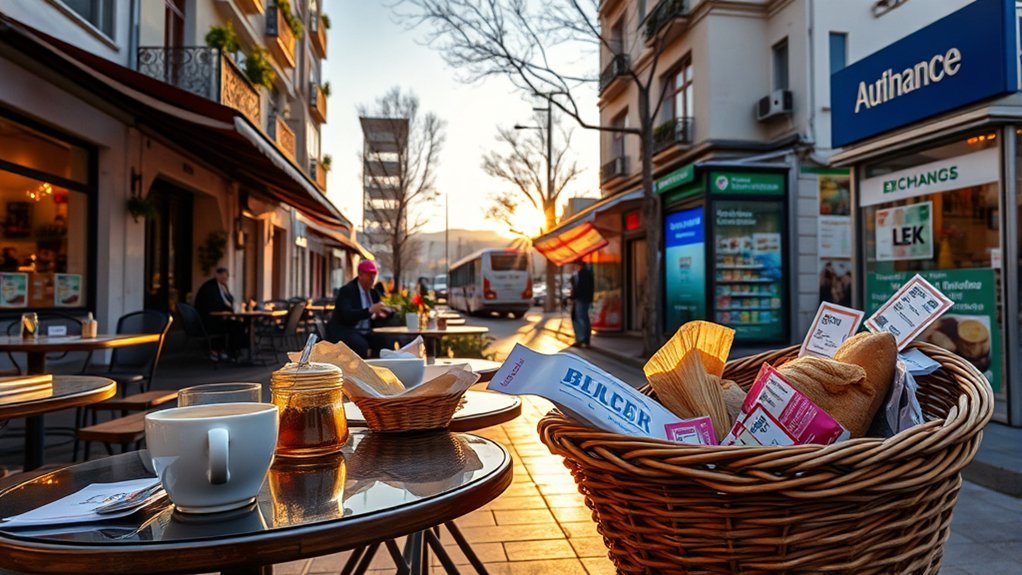
Although Albania’s overall prices sit below the global average, you’ll still find costs vary a lot by city and lifestyle: the national cost-of-living index was about 42.1 in April 2025 (Tirana 44.0) and average monthly living expenses run near $1,023, making the country roughly 1.12 times cheaper than the world average and ranking 89th of 197.
Albania is notably cheaper than average—costs vary by city and lifestyle, with Tirana being pricier.
You’ll see living costs driven by groceries and dining (~$320–$420 for a couple), utilities (~$53–$81), and internet (~$17–$28; 100 Mbps ≈ $28).
Public transport typically costs $22–$50 monthly, a cheap meal is ~1,000 Lek, and a cappuccino about 164 Lek.
Note that average net pay (~55,656 Lek / $704) covers only a portion of typical living expenses, so if you rely on local wages you’ll need to budget carefully or supplement income.
Compare cities and habits: Tirana is pricier, especially for rent, while smaller towns offer noticeably lower day-to-day costs.
Housing Costs: Rent and Buying Property
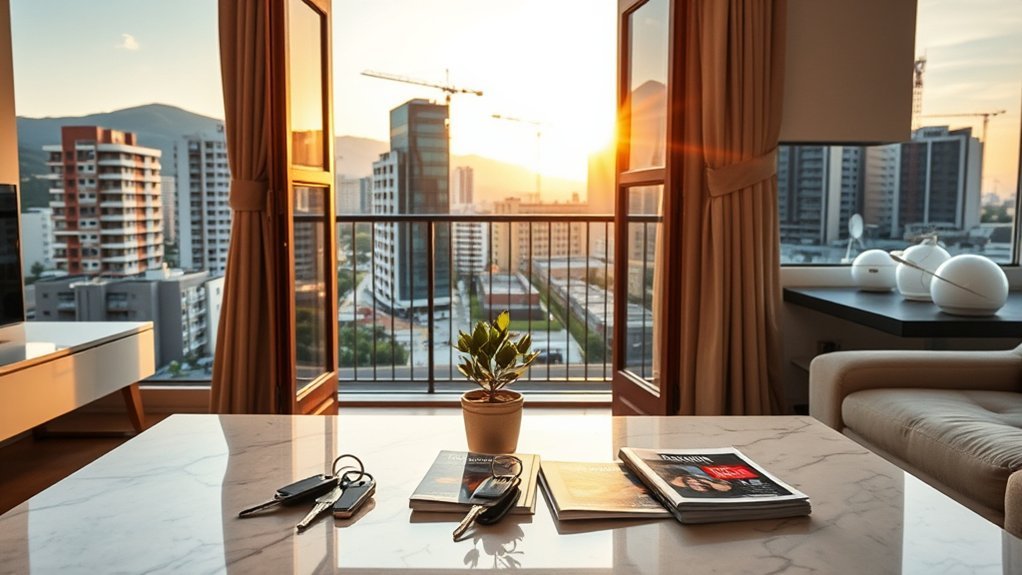
When you’re weighing housing options in Albania, rent and purchase prices change a lot by city and neighborhood: in Tirana a furnished 1‑bed near the center typically runs about €365–€380 (≈44,163 Lek), while a similar unit outside the center is nearer 32,271 Lek and three‑bed city‑centre flats average roughly 82,566 Lek.
You’ll find rents in Tirana are the highest; outside the capital prices drop roughly 30% and smaller towns or suburbs can be substantially cheaper.
If you want an Apartment in City as a long‑term rental, expect better monthly rates than short‑term or Airbnb listings.
Buying is competitive: central prices average ~19,665 Lek/sq ft versus ~11,256 Lek/sq ft outside centre, and example 2‑bed apartments trade around €130,000.
Factor in modest monthly utilities and prefer long‑term leases for savings.
Compare neighborhoods carefully—location and quality make the biggest difference to both rent and resale value.
Utilities, Internet, and Monthly Bills
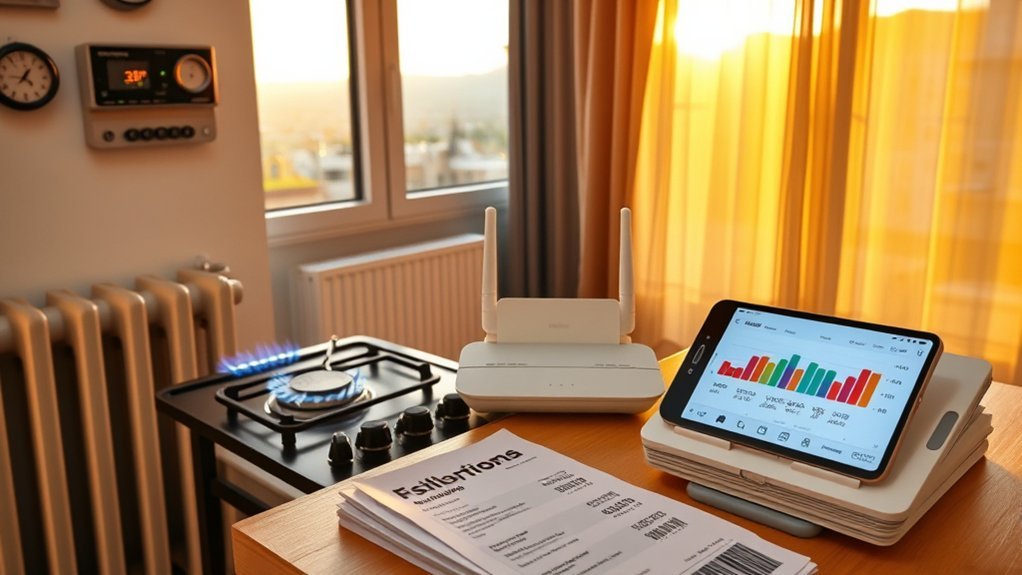
Managing monthly bills in Albania is straightforward and generally affordable compared with Western Europe — for an 85–95 m² apartment you’ll typically pay about 8,537 Lek (~$82) for basic utilities (electricity, heating/cooling, water, garbage), while smaller flats often run closer to $60 and larger units can start around $95 depending on season and usage.
Managing monthly utilities in Albania is simple and affordable—about 8,537 Lek (~$82) for an 85–95 m² apartment.
You’ll find predictable costs: internet, mobile, and small recurring items add up but remain lower than many Western markets, though expats from cheaper countries may notice a higher cost of living compared with local incomes.
Practical tips help you control spending.
- Home internet (100 Mbps) ~1,663 Lek (~$16)/month; common plans 50–100 Mbps.
- Mobile prepaid (example: Vodafone 10 GB, 200 min, 2,000 texts) ~1,521.5 Lek (~$15)/month.
- Expect small extras (Brita refills, detergents) and in-unit washing machines that cut laundromat costs by about $5/month.
Budget monthly essentials together for a clear, localized view of recurring bills.
Grocery and Food Prices
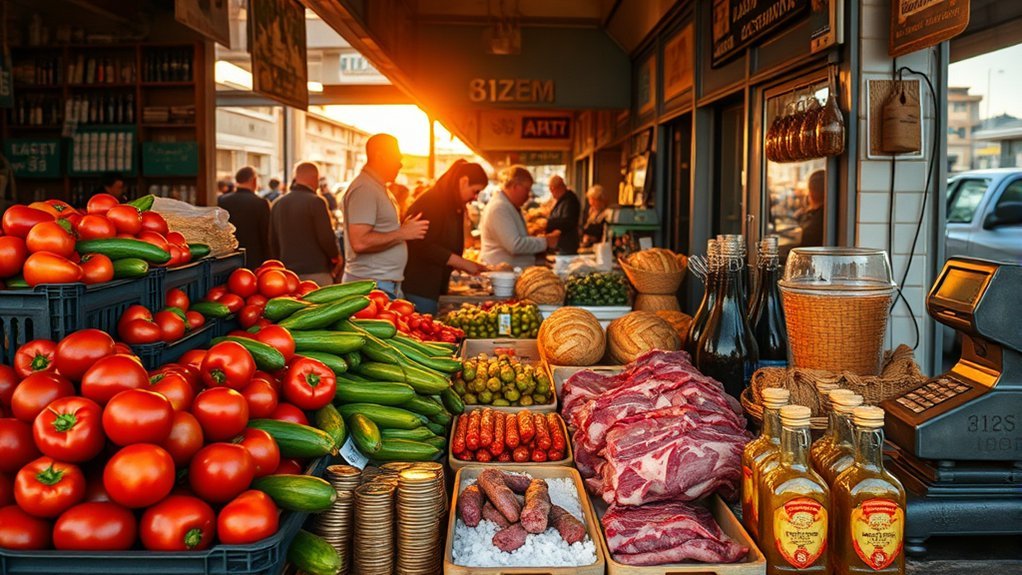
If you shop at local markets in Albania you’ll stretch your leva further—fresh produce and basics are much cheaper than imported goods at supermarkets.
Expect around $320/month for a market-focused couple versus $420+ if you rely on imported items and big chains.
Eating out is also affordable, with local meals about 1,000 Lek and a McMeal near 700 Lek, so occasional restaurant nights won’t blow your food budget.
Market Vs Supermarket
Shop around: choosing farmers’ markets over supermarkets can shave roughly $100 a month off a couple’s grocery bill in Albania — about $320/month with a market-focused approach versus $420+ if you rely more on imported supermarket goods.
You’ll find fresh produce, bread (≈77.93 Lek per 0.5 lb) and local milk options (≈670.21 Lek per gallon) cheaper at markets; supermarkets push prices up with imported dairy and packaged brands.
As a market-focused couple, prioritize perishables at markets and use supermarkets selectively for nonperishables, toiletries, and items you can’t find locally.
- Buy vegetables, fruit and meat at the market for best value.
- Reserve supermarkets for imported or specialty products.
- Shop weekly to maximize freshness and minimize waste.
Eating Out Costs
Eating out in Albania stays affordable compared with many Western countries, and you’ll quickly notice prices tilt toward casual local spots rather than pricey tourist restaurants.
For eating out costs, a basic inexpensive meal runs about 1,000 Lek (≈ $7–$8), while a McMeal is nearer 700 Lek (≈ $5–$6), so quick lunches are cheap. Coffee outings are tiny splurges — a cappuccino averages ~164 Lek (≈ $1.50–$2).
Grocery-wise, staples like milk (~670 Lek/gallon), bread (~78 Lek/lb) and a dozen eggs (~313 Lek) keep home cooking economical. Meat and produce are often cheaper at farmers’ markets than supermarkets; a couple shopping markets can budget around $320/month, while those buying imported items may exceed $420/month.
Eating Out and Entertainment Expenses
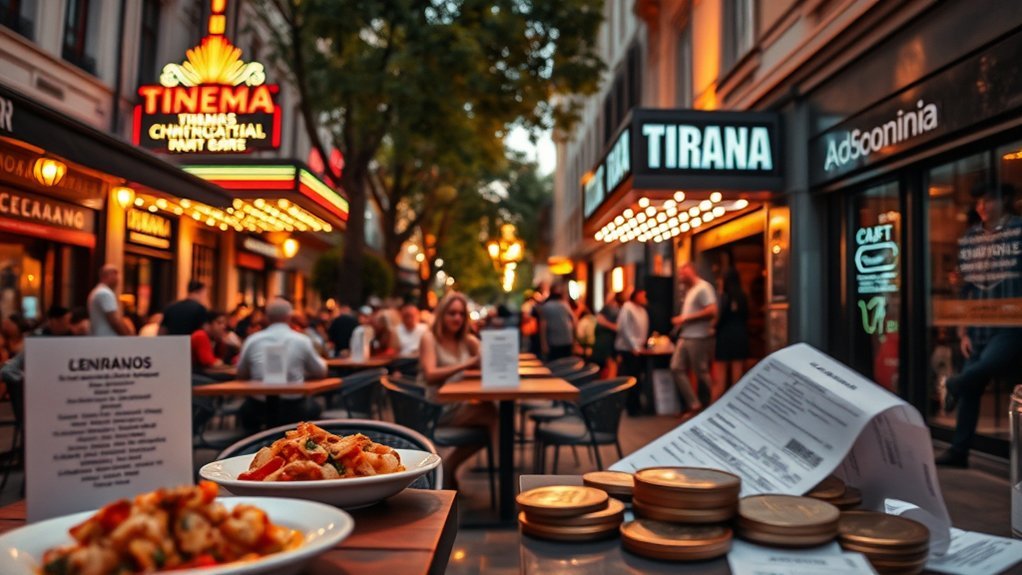
Usually you’ll find dining out in Albania is quite affordable compared with Western Europe or North America: a basic local meal runs about 1,000 Lek (~$7–$8) and a McMeal is roughly 700 Lek (~$5–$6), while a mid-range dinner for two averages around $44.80.
You’ll notice eating out stretches your budget less here; pasta plates in casual spots can be as low as $5, and coffee culture is cheap — a cappuccino is about 164 Lek (~$1.90–$2.00). For entertainment, expect modest prices: cinema tickets near $8.30 and gyms about $50/month.
- Quick take: local meals, cheap coffee, affordable beer ($2.50–$3.00).
- Budget couple: eating out twice weekly ≈ $180/month; more frequent dining ≈ $280/month.
- Nightlife: alcohol and outings typically add $120–$220/month depending on habits.
You can live comfortably if you mix local eateries with occasional mid-range dinners and keep nightlife choices moderate.
Transportation, Connectivity, and Walkability
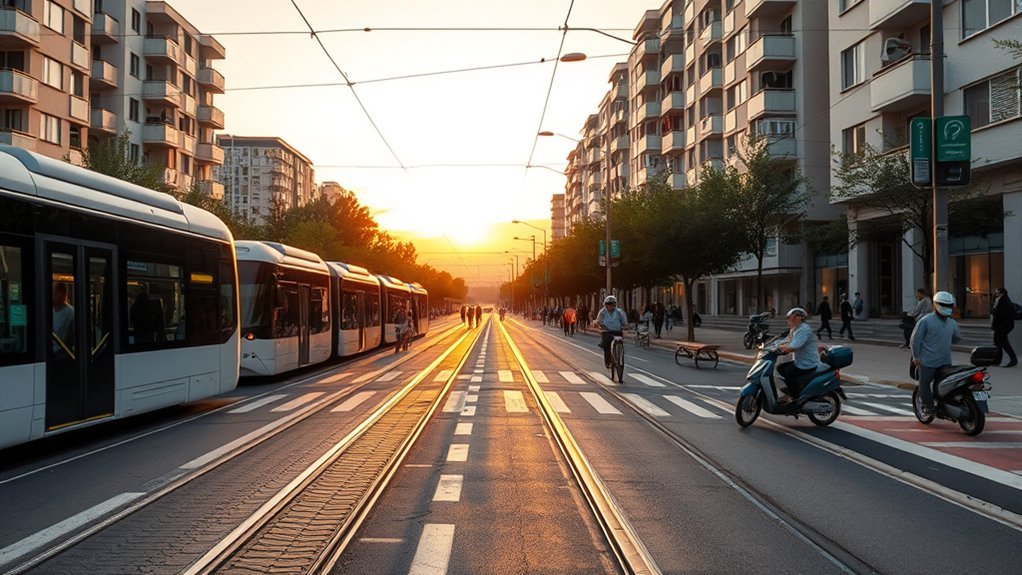
In central Tirana you can walk to most shops, cafes, and services in 5–20 minutes, which makes errands cheaper and faster than relying on a car.
When you do need transit, frequent buses cost about 40 Lek per ride or roughly 1,600 Lek for a monthly pass, while taxis and occasional rides raise your monthly transport bill.
For work and streaming, home Wi‑Fi runs about $17–$28/month and prepaid mobile plans are inexpensive, so connectivity costs are modest compared with many European capitals.
Walkability and Layout
Central Tirana is very walkable, so you can get most errands, shops and cafés within a 5–20 minute walk and keep most daily travel under about 2 km (1.2 miles).
Living in Albania’s capital feels compact—around 600,000 people gives a city scale that supports walking for errands and short commutes.
You’ll rely less on cars compared with sprawling cities, saving money and time.
- Most neighborhoods cluster groceries, cafés and services within short walks.
- Taxis and buses fill gaps when distances or weather make walking impractical.
- Strong internet and mobile coverage mean you can plan routes or work remotely while on foot.
Choose central neighborhoods if you want daily life organized around walking and quick trips.
Public Transport Options
You’ll find public transport in Tirana practical and affordable, with city buses covering core routes and taxis (Blue Taxi, Patoko) filling in gaps you can book via apps or WhatsApp.
A one-way local ticket on buses is about 40 Lek (~$0.40); monthly passes run near 1,600 Lek (~$16), so if you commute daily a month-long pass usually saves you money.
Expect a typical local-transport budget around $50 monthly; rely more on taxis and that figure can climb toward $120.
Central Tirana’s strong walkability cuts short-trip costs, so you’ll often walk instead of buying extra rides.
If you drive, factor in gasoline (≈729 Lek/gal) when comparing car ownership to public options.
Internet and Mobile Plans
While Tirana’s transport and walkability make getting around cheap, connectivity keeps you productive and entertained—home broadband runs about $17–$28/month for 100 Mbps with unlimited data, and prepaid mobile plans (like Vodafone’s 10 GB package) cost roughly $18 per 30 days including ~200 minutes and 2,000 texts.
You’ll find reliable city coverage and straightforward setups, so your estimated monthly bills are easy to budget. If you’re a couple, two SIMs push mobile costs to about $36/month, still cheaper than frequent taxis.
Consider these quick comparisons:
- Home broadband: $17–$28/month (100 Mbps, unlimited) — strong in Tirana.
- Mobile prepaid: ≈$18/30 days (10 GB, minutes, texts).
- Transport + connectivity combined: estimated monthly $50–$120 depending on taxi use.
Healthcare, Insurance, and Safety Nets
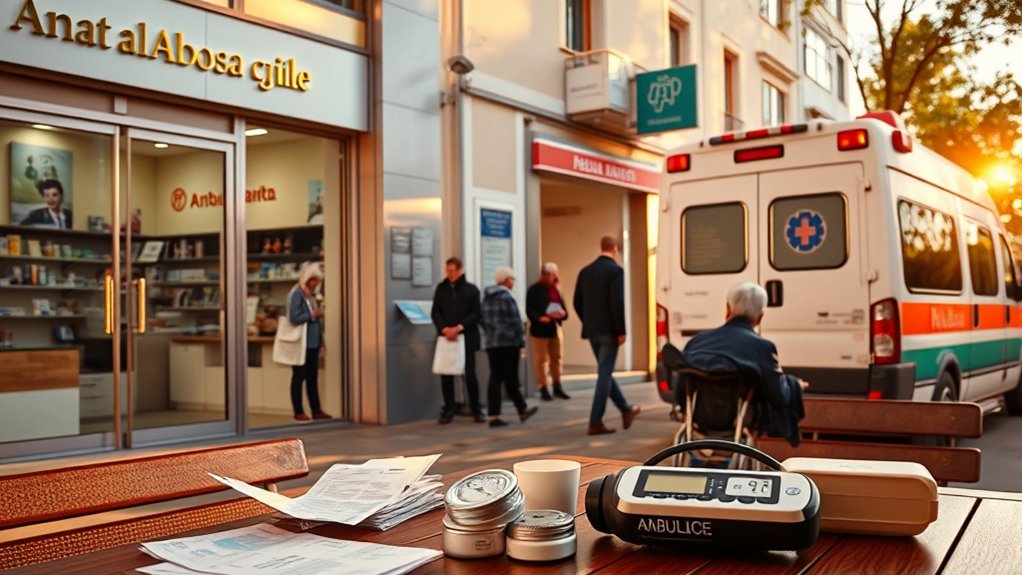
If you’re moving to Albania, plan on combining public care with private coverage, since public facilities are available but can be limited and private clinics—where a typical GP visit runs around $28—offer faster service and more English‑speaking staff.
Insurance is commonly recommended for expats and pensioners; private or international plans smooth access to private clinics and may be required for residency permits alongside proof of pension and a clean record.
You’ll find pharmacies throughout cities with low medication prices, but for complex procedures many residents travel to Greece or Italy.
Emergency out‑of‑pocket costs and specialist care can be relatively high, so carry an emergency fund or international medical evacuation policy. Compare local insurers, coverage limits, and hospital networks before you sign.
In practical terms, blend public access for routine needs with private insurance for speed and language support, and plan contingencies for specialist care outside Albania.
Budgeting for Retirees and Long-Term Residents
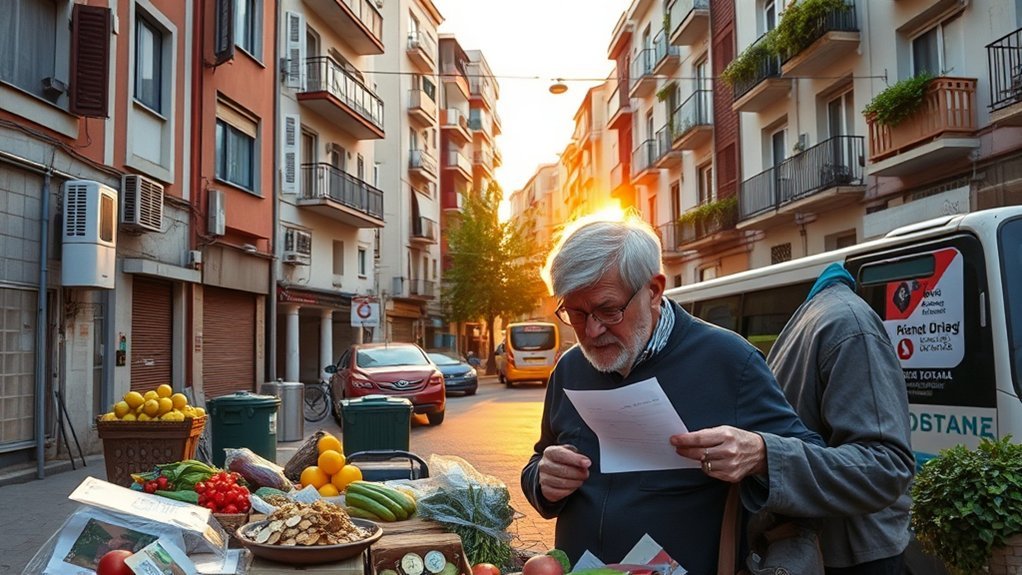
Because Albania’s costs sit well below many Western countries, you can retire comfortably on a modest budget—roughly $700–$1,000/month—by mixing local housing, markets, and selective private services.
You’ll find long‑term furnished Apartment options in Tirana from about €380 (~$422) to ~$700 for central or larger units; city‑center 1‑beds average ~44,163 Lek (~$534) and outside‑centre ~32,271 Lek (~$368).
Utilities for a small Apartment run ~$60–$95/month.
Keep core monthly categories in mind:
- Housing + utilities: plan $368–$534 for rent plus $60–$95 utilities.
- Food, transport, comms: groceries ~$160pp (couple ~$320), local transport $22–$50, internet ~$17–$28.
- Healthcare, residency, buffer: private insurance, visa/residency proofs, and an emergency/entertainment buffer $150–$300.
You’ll compare neighborhoods (lower rent outside center) and prioritize spending—local markets, occasional private services—to hit your target budget without sacrificing comfort.
Practical Tips for Managing Money in Albania

Get a handle on your monthly outgoings by locking in local rates for rent, utilities and services—think €380 (~44,163 Lek) for a central furnished 1‑bed (about 30% less outside center).
$60–$95 for utilities, and ~$28 for 100 Mbps internet.
Track living expenses with a simple spreadsheet: separate rent, utilities, groceries, transport and extras.
Shop markets for produce to cut grocery bills to about $320/month versus $420+ if you buy imported items; eat out locally for $5–$7 a meal when you want convenience.
Use prepaid mobile plans (Vodafone ≈ $18/30 days for 10 GB); couples often run two SIMs (~$36/month) to avoid shared billing surprises.
Move money and pay rent using mid‑market services (Wise supports local accounts) to avoid bank markups.
Negotiate longer leases for lower rent, compare electricity providers where possible, and set an emergency fund equal to two–three months’ living expenses to handle seasonal price swings or unexpected costs.
Frequently Asked Questions
Can a US Citizen Live in Albania?
Yes — you can live in Albania; you’ll enter visa‑free for a year, then apply for residency (pensioner, property, or other permits). It’s affordable compared to the U.S.; budget, secure health insurance, and hire local help.
How Much Money Do I Need to Retire in Albania?
You’ll need about $700–$1,000/month to live modestly in Albania; you’ll manage on €380–€700 rent, lower groceries, cheap utilities, and local transport — more if you want nightlife, convenience, or Airbnb comforts.
How Much Is Rent in Albania per Month?
Rent in Albania varies: you’ll pay about $390–$534/month for a one‑bedroom (cheaper outside Tirana), around $650–$1,000 for three‑bedrooms, with suburbs or smaller towns roughly 30% less and utilities ~$60–$95.
How Far Does the Dollar Go in Albania?
Figuratively, a dollar stretches: you’ll buy more in Albania than in many places. You’ll cover cheap groceries, bus rides, and occasional meals affordably; rent and utilities still dominate, but daily expenses stay pleasantly low.
Conclusion
Living in Albania can feel like trading a stormy city for a calm harbor: you’ll still need sails (budgeting) and a reliable anchor (local knowledge). Compared to Western Europe, your euros stretch farther here, but utilities, healthcare, and imported goods remind you to plan. Rent varies like coastal tide—low inland, higher on the Riviera. Use local markets, learn transport routes, and buy insurance; these small anchors keep your daily life steady and affordable.

